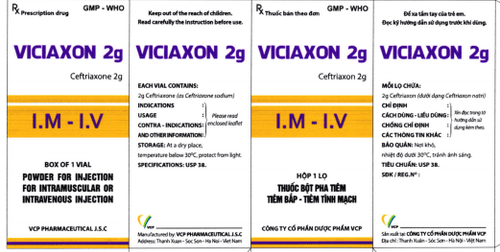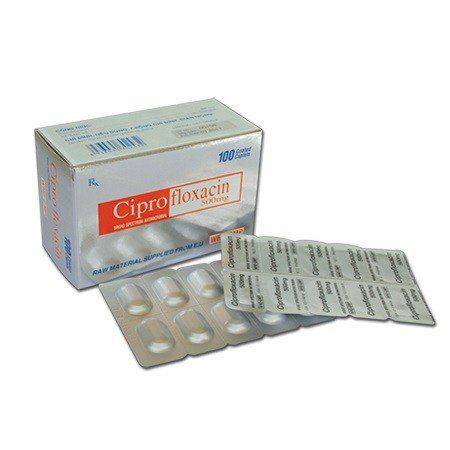This is an automatically translated article.
Klotacef is an antibiotic, commonly used to treat bacterial infections in the body such as rhinitis, otitis media, skin or abdominal infections, kidney infections and urinary tract infections,... It is important to follow the doctor's instructions for taking the medicine to avoid unwanted side effects.1. What are the effects of Klotacef?
Klotacef medicine contains the active ingredient Ceftriaxone (as Ceftriaxone sodium) 1g. This is an antibiotic with anti-inflammatory effect, usually used for injection into the body by intravenous route or in muscle, for poor absorption through the digestive tract.
2. Indications and contraindications
Klotacef is indicated for use in the following cases:
Patients with respiratory, ear - nose - throat, kidney - urogenital infections, blood infections or purulent meningitis. Used in the prophylaxis of problems such as postoperative infections, infections of bones, joints, skin, wounds and soft tissues, cholangitis, peritonitis, cholecystitis and gastrointestinal infections. In addition, Klotacef is contraindicated in patients with hypersensitivity to Ceftriaxone or Cephalosporins and Penicillins.
3. Dosage and usage
Klotacef can be used intravenously or intramuscularly with reference doses as follows:
Adults & children > 12 years old: Use dose 1-2g/day; In severe cases, the dose is 4g/day. Children 15 days old to 12 years old: Use at a dose of 20 - 80mg/kg. Children 14 days old: Use the drug at a dose of 20-50mg/kg/day. Meningitis: Use at a dose of 100mg/kg x 1 time/day, but note that the maximum dose is only 4g. Gonorrhea: Used intravenously a single dose of 250mg. Prophylaxis before surgery: Use with a dose of 1 - 2g injected 30 - 90 minutes before surgery.
4. Side effects
During the use of Klotacef, patients may experience some of the following side effects:
There is inflammation at the injection site. Hematologic disorders or skin allergies; Nausea or severe vomiting may occur. Abdominal pain or diarrhea. These side effects are not all symptoms that the patient may experience. Unwanted effects of the drug can depend on factors such as the body, the physical condition of each person. Therefore, when any side effect occurs, the patient must immediately notify the specialist to avoid affecting daily activities.
5. Drug interactions
Klotacef may interact with a number of other drugs that affect each other's ability to work, concentration or produce other pharmaceutical chemicals that are harmful to the health of the user. Therefore, patients should avoid taking Klotacef with drugs such as Ca-containing solutions, Chloramphenicol, Aminoglycosides, Aminosides, Furosemide, Ethacrynic Acid and Probenecid.
Consult a specialist when planning to combine Klotacef with other drugs. At that time, doctors (or medical professionals) will give advice and instructions to avoid drug interactions.
6. Use caution
Some of the following cases need to be considered before using or cautious during the use of Klotacef including:
Pregnant or breastfeeding women should be careful when taking Klotacef. Patients with renal failure or those with impaired liver and kidney function. In addition, patients also need to pay attention to using the drug exactly as recommended by the doctor. In case of drug overdose, users need to monitor their health status. If you notice any strange symptoms, see your doctor for timely treatment.
Above is all information about the drug Klotacef, patients need to carefully read the instructions for use, consult a doctor / pharmacist before using. Note, Klotacef is a prescription drug, patients must absolutely not buy drugs and treat them at home because they may experience unwanted side effects.













